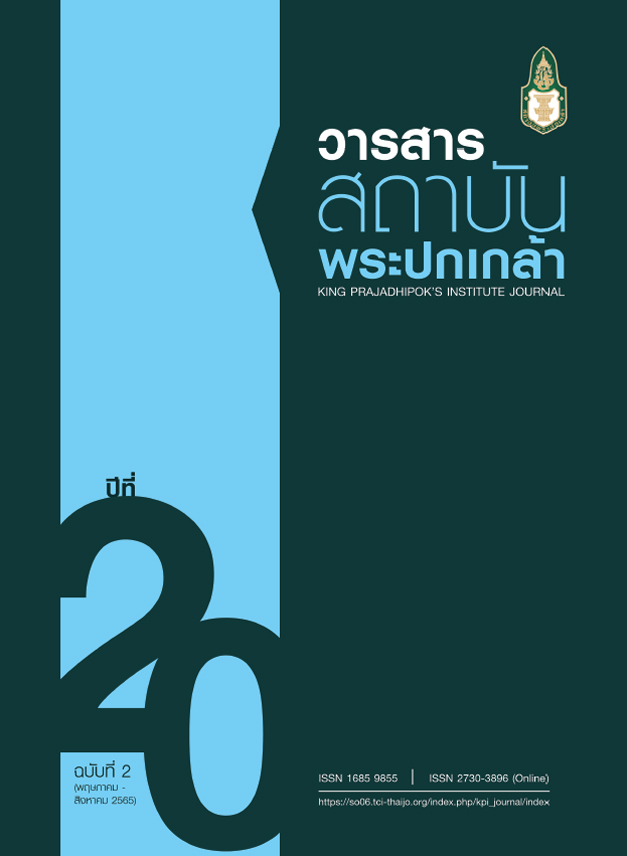การเลือกตั้งสมานฉันท์และไม่ซื้อสิทธิขายเสียงกรณีศึกษาการเลือกตั้งท้องถิ่นจังหวัดชัยภูมิ เติมเต็มวงจรการเลือกตั้งโดยส่งเสริมกระบวนการมีส่วนร่วมของผู้มีสิทธิเลือกตั้ง
Main Article Content
บทคัดย่อ
การเลือกตั้งคือกลไกสำคัญในการเปลี่ยนผ่านการเมืองอย่างสันติตามหลักประชาธิปไตย อย่างไรก็ตาม กระบวนการเลือกตั้งที่ผ่านมา บทบาทของผู้มีสิทธิเลือกตั้งมักหายไปจากวงจรของการเลือกตั้ง ทั้งๆ ที่ประชาชนคือเจ้าของอำนาจอธิปไตย และควรได้ใช้โอกาสนี้ต่อรองและสร้างความเปลี่ยนแปลงทางการเมืองบางประการเพื่อปรับปรุงคุณภาพชีวิตของตนให้ดีขึ้น และแม้ว่าการเลือกตั้งที่บริสุทธิ์ยุติธรรมจะได้รับการบัญญัติไว้ในรัฐธรรมนูญแห่งราชอาณาจักรไทยเรื่อยมา แต่บทบาทของประชาชนในกระบวนการเลือกตั้งกลับยังไม่ได้รับการส่งเสริม
อย่างเป็นรูปธรรม บทความนี้พัฒนาขึ้นจากโครงการเลือกตั้งสมานฉันท์และไม่ซื้อสิทธิขายเสียงในการเลือกตั้งนายกองค์การบริหารส่วนตำบลของจังหวัดชัยภูมิ 3 แห่ง ที่จัดขึ้นในเดือนพฤศจิกายน พ.ศ. 2564 โดยมีวัตถุประสงค์เพื่อศึกษาความเป็นไปได้ในการอุดช่องว่างและส่งเสริมการมีส่วนร่วมของผู้มีสิทธิเลือกตั้งที่มักขาดหายไปในฤดูกาลเลือกตั้ง ผ่านการจัดเวทีประชาเสวนา (citizen dialogue) ระหว่างผู้สมัครและผู้มีสิทธิเลือกตั้ง โดยผลที่คาดว่าจะได้รับคือ ผู้เข้าร่วมโครงการทราบถึงบทบาทการมีส่วนร่วมของผู้มีสิทธิเลือกตั้งในกระบวนการเลือกตั้งมากขึ้น ตระหนักถึงศักยภาพของตนในการสร้างความเปลี่ยนแปลงทางการเมืองผ่านการเลือกตั้ง และรับรู้ถึงบรรยากาศในกระบวนการหาเสียงเลือกตั้งว่าเป็นไปโดยสร้างสรรค์ มีการซื้อสิทธิขายเสียงลดลง และชุมชนยังสามารถดำรงความสมานฉันท์ไว้ได้แม้ภายหลังการเลือกตั้ง
Article Details

อนุญาตภายใต้เงื่อนไข Creative Commons Attribution-NonCommercial-NoDerivatives 4.0 International License.
@ 2020 King Prajadhipok's Institute The Government Complex Commemorating All Right Reserved.
เอกสารอ้างอิง
ภาษาไทย
จารุวรรณ แก้วมะโน. (2562). โครงการวิจัยเชิงปฏิบัติการเพื่อส่งเสริมชุมชนพลเมืองเข้มแข็งผ่านการเลือกตั้งสมานฉันท์และไม่ซื้อสิทธิขาย. สืบค้นจาก https://www.kpi.ac.th/
knowledge/research/data/299
ชัยพงษ์ สำเนียง. (2561). การซื้อสิทธิขายเสียงในฐานะการเมืองของการต่อรองอัตลักษณ์. วารสารรัฐศาสตร์และรัฐประศาสนศาสตร์, 9(2), 1-48.
ชาญชัย จิตรเหล่าอาพร. (2561). การทุจริตการเลือกตั้ง: อุปสรรคการทำให้เป็นประชาธิปไตยของไทย. วารสารรัฐศาสตร์ มหาวิทยาลัยสุโขทัยธรรมาธิราช, 2(2), 1-17.
พัชรี สิโรรส. (2552). ประชาธิปไตยแบบสานเสวนา ความเชื่อ ความฝันและความเป็นไปได้ในสังคมไทย. วารสารวิทยาการจัดการ, 26(1), 75-90.
แมทธิวส์, เดวิด. (2552). การเมืองภาคพลเมือง [Politics for People : Finding a Responsible Public Voice] (วันชัย วัฒนศัพท์, ผู้แปล). ขอนแก่น: สถาบันสันติศึกษามหาวิทยาลัยขอนแก่น.
วันชัย วัฒนศัพท์. (2557). ประชาธิปไตยแห่งการสานเสวนาหาทางออก ประชาธิปไตยแห่งการ
ปรึกษาหารือ (deliberative democracy). กรุงเทพฯ: สำนักพิมพ์คณะรัฐมนตรและ
ราชกิจจานุเบกษา.
วันชัย วัฒนศัพท์ และถวิลวดี บุรีกุล. (2555). คู่มือการเป็นผู้เอื้อกระบวนการประชาเสวนา
หาทางออก. (พิมพ์ครั้งที่ 4). กรุงเทพฯ: สถาบันพระปกเกล้า.
วิไลวัจส์ กฤษณะภูติ. (2557). แนวทางการป้องกันการซื้อสิทธิขายเสียงในการเลือกตั้ง ตามความคิดเห็นของประชาชนในภาคตะวันออกเฉียงเหนือ. วารสารวิชาการแพรวากาฬสินธุ์ มหาวิทยาลัยราชภัฏกาฬสินธุ์, 1(2), 64-75.
วิสุทธิ์ โพธิแท่น. (2550). แนวคิดพื้นฐานของประชาธิปไตย. กรุงเทพฯ: สำนักพิมพ์คณะรัฐมนตรีและราชกิจจานุเบกษา.
ศุภณัฐ เพิ่มพูนวิวัฒน์. (2555). การประชาเสวนาหาทางออกสู่ประชาธิปไตยและสังคมที่คนไทยพึงปรารถนา (รายงานการวิจัยฉบับสมบูรณ์). ม.ป.พ.
สุวิตา มะมา และสุวิชา เป้าอารีย์. (2564). ประชาธิปไตยแบบปรึกษาหารือของชุมชนบ้านอ่าวอุดม: จากความขัดแย้งสู่การอยู่ร่วมกันอย่างปกติสุขระหว่างท่าเรือพาณิชย์และชุมชน. วารสารการเมืองการปกครอง, 11(2), 31-48.
สุจิต บุญบงการ และพรศักดิ์ ผ่องแผ้ว. (2525). พฤติกรรมการเลือกตั้งของคนไทย : ศึกษาจากการเลือกตั้งสมาชิกสภาผู้แทนราษฎร. (รายงานการวิจัย). กรุงเทพฯ: จุฬาลงกรณ์มหาวิทยาลัย.
สำนักงานคณะกรรมการการเลือกตั้ง,. (2559). การมีส่วนร่วม. สืบค้นจาก https://www.ect.go.th/ect_th/news_page.php?nid=767
. (2560). กระบวนการเลือกตั้ง ส.ส.. สืบค้นจาก https://www.ect.go.th/phatthalung/
ewt_news. php?nid=112&filename=index
อนุสรณ์ พัฒนศานติ์. (2558). การศึกษาความเคลื่อนไหวทางการเมืองและพฤติกรรมการเลือกตั้ง
สมาชิกสภาผู้แทนราษฎร พ.ศ. 2554 : จังหวัดชัยภูมิ. กรุงเทพฯ: สำนักวิจัยและพัฒนา
สถาบันพระปกเกล้า.
โอฬาร ถิ่นบางเตียว และนครินทร์ เมฆไตรรัตน์. (2559). การซื้อสิทธิ์ขายเสียง. สืบค้นจาก http://wiki.kpi.ac.th/index.php?title=การซื้อสิทธิ์ขายเสียง
ภาษาอังกฤษ
Bessette, Joseph. (1980). Deliberative Democracy: The Majority Principle in Republican Government. In Robert A. Goldwin & William A. Schambra (Eds), How Democratic is the Constitution? (pp. 102-116). Washington, D.C., AEI Press.
Brusco, Valeria, Nazareno, Marcelo & Stokes, Susan C. (2004). Vote Buying in
Argentina. Latin American Research Review, 39(2), 66-88.
Chilvers, Jason. (2008). Deliberating Competence: Theoretical and Practitioner Perspectives on Effective Participatory Appraisal Practice. Science, Technology, & Human Values, 33(3), 421-451.
Cruz, Cesi. (2019). Social Networks and the Targeting of Vote Buying. Comparative
Political Studies, 52(3), 382–411.
DeBats, Donald A. (2016). Vote Buying in Nineteenth Century US Elections. U.S.A : The Institute for Advanced Technology in the Humanities, University of Virginia.
Ecker, Alejandro, Glinitzer, Konstantin & Meyer, Thomas. (2015). Corruption Performance Voting and the Electoral Context. European Political Science Review, 8(3), 333-354.
Eagan, Jennifer L. (2016). Deliberative Democracy. Retrieved from https://www.britannica.com/topic/deliberative-democracy.
Harsen, Richard L. (2000). Vote Buying. California Law Review, 88(5), 1323-1372.
Lehoucq, Fabrice. (2003). Electoral Fraud: Causes, Types, and Consequences. Annual Review of Political Science, 18(6), 233-256.
Lipset, Seymour M. (1959). Some Social Requisites of Democracy: Economic Development and Political Legitimacy. The American Political Science Review, 53(1), 69-105.
Ondo, Assoumou. (2020). Election and Corruption: The Case of Gabon. Academic Journal of Education & Literature, 1(6), 209-224.
Pausch, Markus. (2011). The Qualities of Political Participation Theoretical Classification and Indicators. Hamburg Review of Social Sciences, 6(1), 19-35.
Peters, John G. & Welch, Susan. (1978). Political Corruption in America: A Search for Definitions and a Theory, or If Political Corruption Is in the Mainstream of American Politics Why Is it Not in the Mainstream of American Politics Research?. The American Political Science Review, 72(3), 974-984.
Pham, Lien & KalejaFirst, Ance. (2019). Political Participation Under Conditions of
(Democratic) Duress. Politics, 40(2), 154–169.
Rix, Kathryn. (2008). The Elimination of Corrupt Practices in British Elections’?
Reassessing the Impact of the 1883 Corrupt Practices Act. The English
Historical Review, CXXIII(500), 65–97.
Smith, Cobi & Rowe, Gene. (2016). Deliberative Processes in Practice. In Susan Dodds & Ankeny Rachel. (Eds.), Big Picture Bioethics: Developing Democratic Policy in Contested Domains (pp. 59-70). Cham: Springer International Publishing.
Soneryd, Linda & Lindh, Elisabeth. (2019). Citizen Dialogue for Whom? Competing Rationalities in Urban Planning, The Case of Gothenburg, Sweden. Urban Research & Practice, 12(3), 230-246.
Welch, Susan & Hibbing, John R. (1997). The Effects of Charges of Corruption on Voting Behavior in Congressional Elections, 1982-1990. The Journal of Politics, 59(1),226-239.

